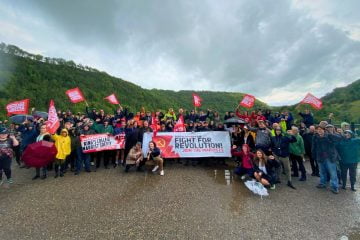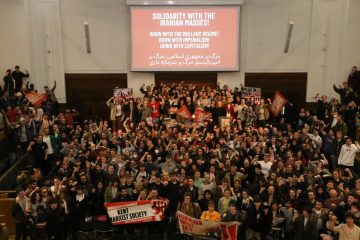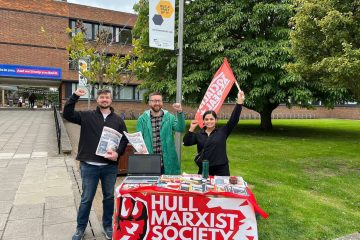The history of all hitherto existing society is the history of class struggle. But what is class and where did it come from? Why do Marxists place so much emphasis on class? What is required to overthrow class society? And what would a society without classes look like?
Join us at Revolution 2015 to discuss these questions and others in the session on the Rise of Class Society.
RECOMMENDED READING:
Origins of the Family, Private Property and the State (Chapter Nine) by Frederick Engels
In Defence of Engels and Morgan by Rob Sewell
Ludwig Feuerbach and the End of Classical German Philosophy (Extract from Chapter Four) by Frederick Engels
“….What is true of nature, which is hereby recognized also as a historical process of development, is likewise true of the history of society in all its branches and of the totality of all sciences which occupy themselves with things human (and divine). Here, too, the philosophy of history, of right, of religion, etc., has consisted in the substitution of an interconnection fabricated in the mind of the philosopher for the real interconnection to be demonstrated in the events; has consisted in the comprehension of history as a whole as well as in its separate parts, as the gradual realization of ideas — and naturally always only the pet ideas of the philosopher himself. According to this, history worked unconsciously but of necessity towards a certain ideal goal set in advance — as, for example, in Hegel, towards the realization of his absolute idea — and the unalterable trend towards this absolute idea formed the inner interconnection in the events of history. A new mysterious providence — unconscious or gradually coming into consciousness — was thus put in the place of the real, still unknown interconnection. Here, therefore, just as in the realm of nature, it was necessary to do away with these fabricated, artificial interconnections by the discovery of the real ones — a task which ultimately amounts to the discovery of the general laws of motion which assert themselves as the ruling ones in the history of human society.
In one point, however, the history of the development of society proves to be essentially different from that of nature. In nature — in so far as we ignore man’s reaction upon nature — there are only blind, unconscious agencies acting upon one another, out of whose interplay the general law comes into operation. Nothing of all that happens — whether in the innumerable apparent accidents observable upon the surface, or in the ultimate results which confirm the regularity inherent in these accidents — happens as a consciously desired aim. In the history of society, on the contrary, the actors are all endowed with consciousness, are men acting with deliberation or passion, working towards definite goals; nothing happens without a conscious purpose, without an intended aim. But this distinction, important as it is for historical investigation, particularly of single epochs and events, cannot alter the fact that the course of history is governed by inner general laws. For here, also, on the whole, in spite of the consciously desired aims of all individuals, accident apparently reigns on the surface. That which is willed happens but rarely; in the majority of instances the numerous desired ends cross and conflict with one another, or these ends themselves are from the outset incapable of realization, or the means of attaining them are insufficient. thus the conflicts of innumerable individual wills and individual actions in the domain of history produce a state of affairs entirely analogous to that prevailing in the realm of unconscious nature. The ends of the actions are intended, but the results which actually follow from these actions are not intended; or when they do seem to correspond to the end intended, they ultimately have consequences quite other than those intended. Historical events thus appear on the whole to be likewise governed by chance. But where on the surface accident holds sway, there actually it is always governed by inner, hidden laws, and it is only a matter of discovering these laws.
Men make their own history, whatever its outcome may be, in that each person follows his own consciously desired end, and it is precisely the resultant of these many wills operating in different directions, and of their manifold effects upon the outer world, that constitutes history. Thus it is also a question of what the many individuals desire. The will is determined by passion or deliberation. But the levers which immediately determine passion or deliberation are of very different kinds. Partly they may be external objects, partly ideal motives, ambition, “enthusiasm for truth and justice”, personal hatred, or even purely individual whims of all kinds. But, on the one hand, we have seen that the many individual wills active in history for the most part produce results quite other than those intended — often quite the opposite; that their motives, therefore, in relation to the total result are likewise of only secondary importance. On the other hand, the further question arises: What driving forces in turn stand behind these motives? What are the historical forces which transform themselves into these motives in the brains of the actors?
The old materialism never put this question to itself. Its conception of history, in so far as it has one at all, is therefore essentially pragmatic; it divides men who act in history into noble and ignoble and then finds that as a rule the noble are defrauded and the ignoble are victorious. hence, it follows for the old materialism that nothing very edifying is to be got from the study of history, and for us that in the realm of history the old materialism becomes untrue to itself because it takes the ideal driving forces which operate there as ultimate causes, instead of investigating what is behind them, what are the driving forces of these driving forces. This inconsistency does not lie in the fact that ideal driving forces are recognized, but in the investigation not being carried further back behind these into their motive causes. On the other hand, the philosophy of history, particularly as represented by Hegel, recognizes that the ostensible and also the really operating motives of men who act in history are by no means the ultimate causes of historical events; that behind these motives are other motive powers, which have to be discovered. But it does not seek these powers in history itself, it imports them rather from outside, from philosophical ideology, into history. Hegel, for example, instead of explaining the history of ancient Greece out of its own inner interconnections, simply maintains that it is nothing more than the working out of “forms of beautiful individuality”, the realization of a “work of art” as such. He says much in this connection about the old Greeks that is fine and profound, but that does not prevent us today from refusing to be put off with such an explanation, which is a mere manner of speech.
When, therefore, it is a question of investigating the driving powers which – consciously or unconsciously, and indeed very often unconsciously — lie behind the motives of men who act in history and which constitute the real ultimate driving forces of history, then it is not a question so much of the motives of single individuals, however eminent, as of those motives which set in motion great masses, whole people, and again whole classes of the people in each people; and this, too, not merely for an instant, like the transient flaring up of a straw-fire which quickly dies down, but as a lasting action resulting in a great historical transformation. To ascertain the driving causes which here in the minds of acting masses and their leaders – the so-called great men – are reflected as conscious motives, clearly or unclearly, directly or in an ideological, even glorified, form – is the only path which can put us on the track of the laws holding sway both in history as a whole, and at particular periods and in particular lands. Everything which sets men in motion must go through their minds; but what form it will take in the mind will depend very much upon the circumstances. The workers have by no means become reconciled to capitalist machine industry, even though they no longer simply break the machines to pieces, as they still did in 1848 on the Rhine.
But while in all earlier periods the investigation of these driving causes of history was almost impossible – on account of the complicated and concealed interconnections between them and their effects – our present period has so far simplified these interconnections that the riddle could be solved. Since the establishment of large-scale industry – that is, at least since the European peace of 1815 – it has been no longer a secret to any man in England that the whole political struggle there pivoted on the claims to supremacy of two classes: the landed aristocracy and the bourgeoisie (middle class). In France, with the return of the Bourbons, the same fact was perceived, the historians of the Restoration period, from Thierry to Guizot, Mignet, and Thiers, speak of it everywhere as the key to the understanding of all French history since the Middle Ages. And since 1830, the working class, the proletariat, has been recognized in both countries as a third competitor for power. Conditions had become so simplified that one would have had to close one’s eyes deliberately not to see in the light of these three great classes and in the conflict of their interests the driving force of modern history — at least in the two most advanced countries.
But how did these classes come into existence? If it was possible at first glance still to ascribe the origin of the great, formerly feudal landed property – at least in the first instance – to political causes, to taking possession by force, this could not be done in regard to the bourgeoisie and the proletariat. Here, the origin and development of two great classes was seen to lie clearly and palpably in purely economic causes. And it was just as clear that in the struggle between landed property and the bourgeoisie, no less than in the struggle between the bourgeoisie and the proletariat, it was a question, first and foremost, of economic interests, to the furtherance of which political power was intended to serve merely as a means. Bourgeoisie and proletariat both arose in consequences of a transformation of the economic conditions, more precisely, of the mode of production. The transition, first from guild handicrafts to manufacture, and then from manufacture to large-scale industry, with steam and mechanical power, had caused the development of these two classes. At a certain stage, the new productive forces set in motion by the bourgeoisie – in the first place the division of labour and the combination of many detail labourers in one general manufactory – and the conditions and requirements of exchange, developed through these productive forces, became incompatible with the existing order of production handed down by history and sanctified by law — that is to say, incompatible with the privileges of the guild and the numerous other personal and local privileges (which were only so many fetters to the unprivileged estates) of the feudal order to society. The productive forces represented by the bourgeoisie rebelled against the order of production represented by the feudal landlords and the guild-masters. The result is known, the feudal fetters were smashed, gradually in England, at one blow in France. In Germany, the process is not yet finished. But just as, at a definite stage of its development, manufacture came into conflict with the feudal order of production, so now large-scale industry has already come into conflict with the bourgeois order or production established in its place. Tied down by this order, by the narrow limits of the capitalist mode of production, this industry produces, on the one hand, an ever-increasingly proletarianisation of the great mass of the people, and on the other hand, an ever greater mass of unsaleable products. Overproduction and mass misery, each the cause of the other – that is the absurd contradiction which is its outcome, and which of necessity calls for the liberation of the productive forces by means of a change in the mode of production.
In modern history at least it is, therefore, proved that all political struggles are class struggles, and all class struggles for emancipation, despite their necessarily political form – for every class struggle is a political struggle – turn ultimately on the question of economic emancipation. Therefore, here at least, the state – the political order – is the subordination, and civil society – the realm of economic relations – the decisive element. The traditional conception, to which Hegel, too, pays homage, saw in the state the determining element, and in civil society the element determined by it. Appearances correspond to this. As all the driving forces of the actions of any individual person must pass through his brain, and transform themselves into motives of his will in order to set him into action, so also all the needs of civil society – no matter which class happens to be the ruling one – must pass through the will of the state in order to secure general validity in the form of laws. That is the formal aspect of the matter – the one which is self-evident. The question arises, however, what is the content of this merely formal will – of the individual as well as of the state — and whence is this content derived? Why is just this willed and not something else? If we enquire into this, we discover that in modern history the will of the state is, on the whole, determined by the changing needs of civil society, but the supremacy of this or that class, in the last resort, by the development of the productive forces and relations of exchange.
But if even in our modern era, with its gigantic means of production and communication, the state is not an independent domain with an independent development, but one whose existence as well as development is to be explained in the last resort by the economic conditions of life of society, then this must be still more true of all earlier times when the production of the material life of man was not yet carried on with these abundant auxiliary means, and when, therefore, the necessity of such production must have exercised a still greater mastery over men. If the state even today, in the era of big industry and of railways, is on the whole only a reflection, in concentrated form, of the economic needs of the class controlling production, then this must have been much more so in an epoch when each generation of men was forced to spend a far greater part of its aggregate lifetime in satisfying material needs, and was therefore much more dependent on them than we are today. An examination of the history of earlier periods, as soon as it is seriously undertaken from this angle, most abundantly confirms this. But, of course, this cannot be gone into here….”



